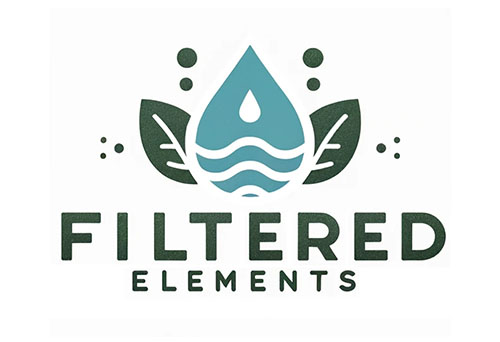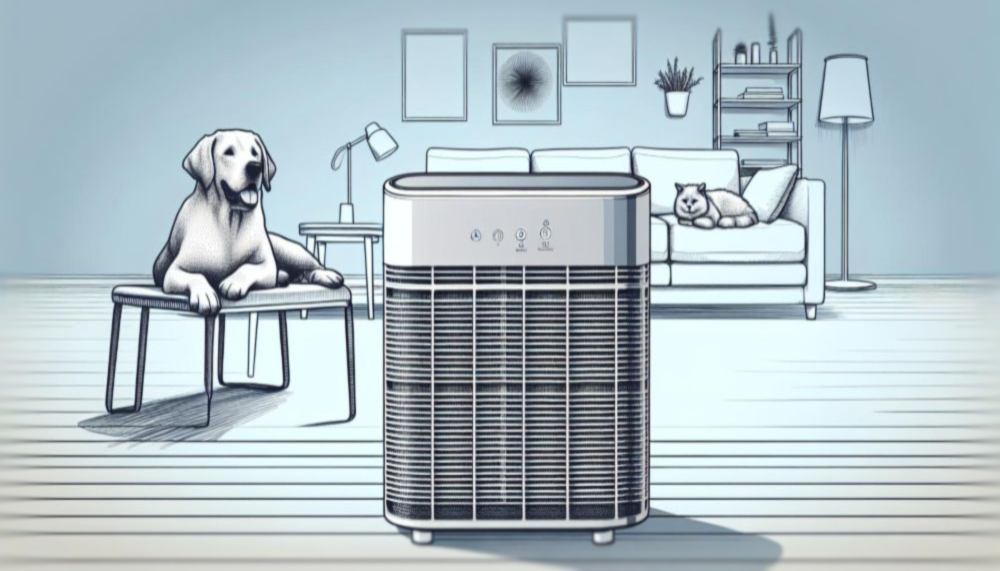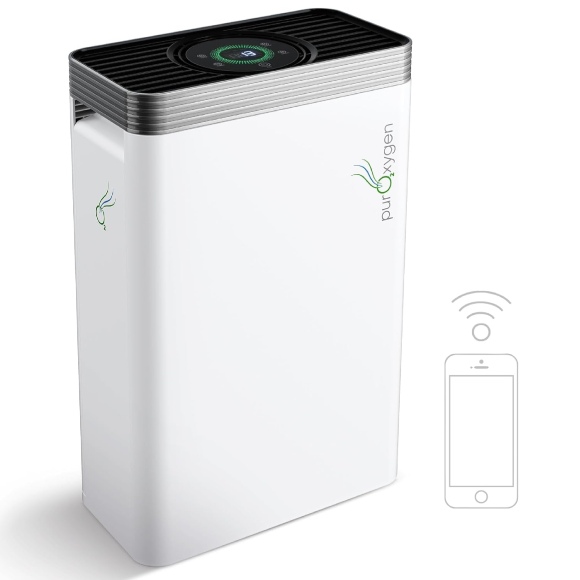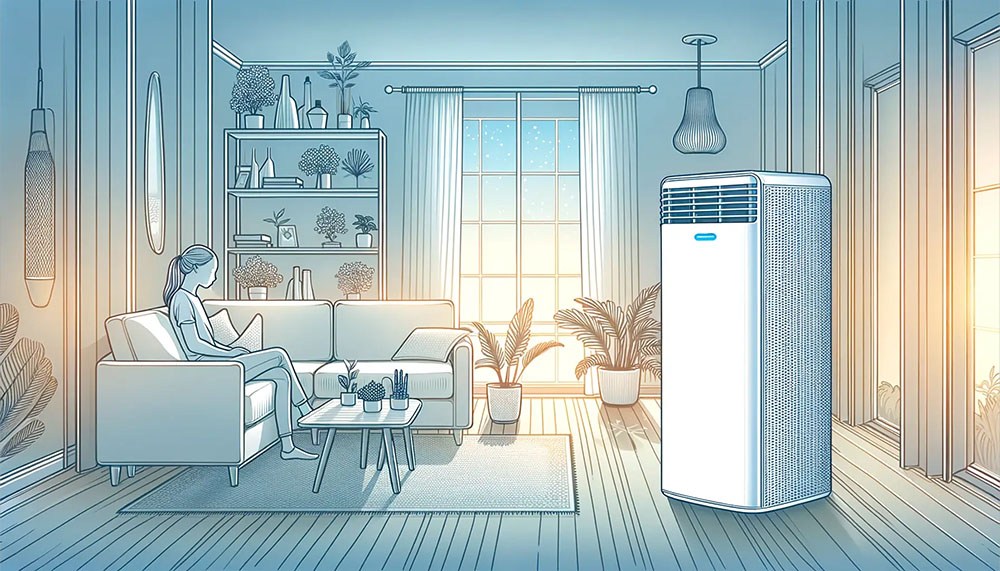Pets bring immeasurable joy to our lives, but there’s no denying that they also bring along some less-than-desirable elements. From shedding fur to producing dander and odors, our beloved animals can significantly reduce indoor air quality. These are the main reasons why air purifiers have become popular among pet owners.
Air purifiers can clean up the air, reduce the effects of allergies, generally making our homes fresher and healthier. Most air purifiers are perfectly safe for pets, but there are few things to look for when choosing one for a home with pets.
This article will cover what exactly to avoid and what you need to know to find an air purifier that is safe for your pet. Then we will dive into which purifiers will be most effective for helping with the common pet issues of hair, dust, dander, and odors.
The Risks of Air Purifiers for Pets
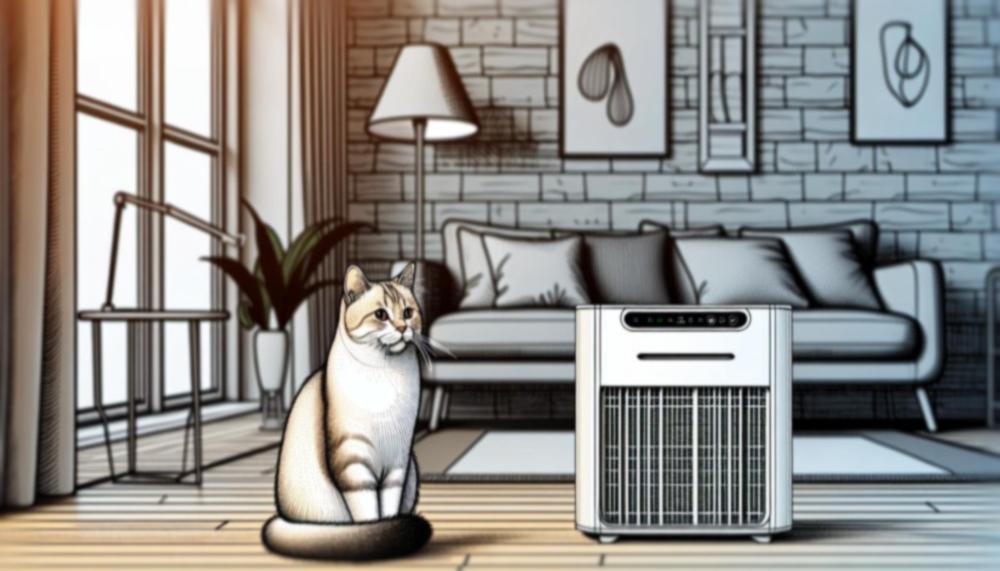
The main thing to look for when you are shopping for an air purifier for your pet is that it does not produce ozone. Not all purifiers produce ozone, but some do as it is useful for killing bacteria, virus, and odors. Ozone has been shown to have negative respitory effects on many household pets, and it is especially dangerous for birds which are more sensitive to it
What is Ozone?
Ozone is a molecule made up of three oxygen atoms, found both high in the atmosphere and at ground level. While it shields the earth from ultraviolet rays when high above, at ground level it becomes a harmful pollutant. Ozone is often used in some air purifiers to eliminate odors and pollutants. For example, some UV-C air purifiers can split oxygen molecules into individual atoms, leading to the formation of ozone in a process similar to that in ozone generators.
Additionally, ionizing purifiers, or purifiers with an ionizer feature, may produce ozone. Ionizers in air purifiers use negative ions to improve indoor air quality by attaching to and weighing down airborne particles like dust and pollen, effectively removing them from the air. While concerns about ozone exist, many modern ionizers are designed to purify air without producing significant ozone levels.
Why Is Ozone Dangerous for Pets?
Ozone is a strong irritant that can damage the airways, posing significant risks to humans and animals alike. Exposure may lead to respiratory issues such as coughing, throat irritation, and worsened asthma. It’s particularly harmful to those with respiratory conditions or compromised immune systems.
Pets face even greater dangers from ozone due to their generally faster breathing rates and tendency to stay close to the ground, where ozone concentrations can be higher. This makes them more susceptible to inhaling this pollutant, which can be harmful.
Pets with these existing health issues are especially at risk from ozone exposure:
- Respiratory Problems: Pets with conditions like asthma may see their symptoms worsen under ozone exposure.
- Cardiac Concerns: Those with heart conditions may suffer increased issues due to the stress and inflammation ozone can cause.
- Sensitive Groups: Very young or old pets are more vulnerable due to their weaker immune systems.
To summarize, while you should avoid ozone-generating purifiers, there are many good air purifiers don’t pose this risk for you or your pets. In fact, for people who love and have pets, air purifiers are great for a variety of reasons.
Benefits of Air Purifiers for Pets
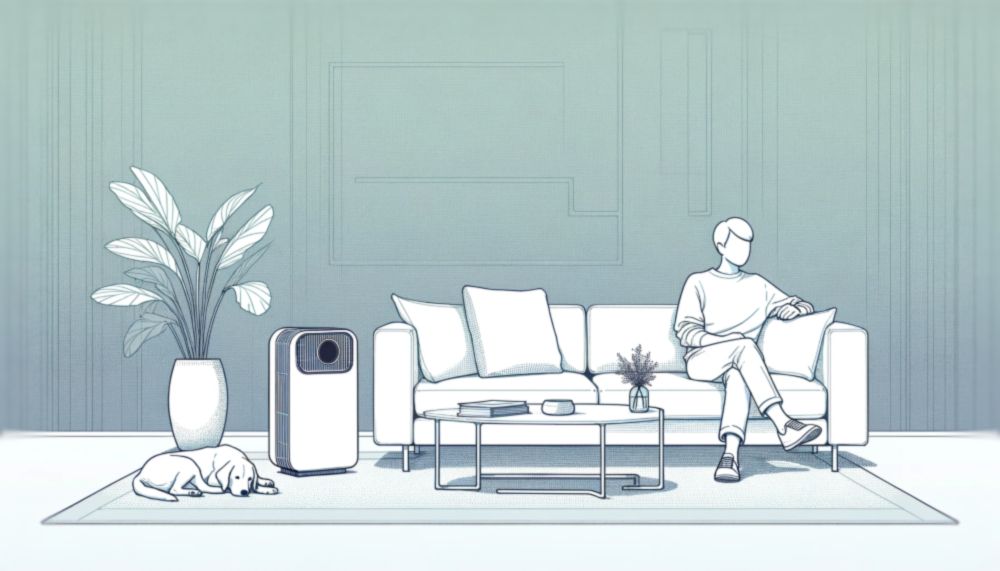
A common question pet owners have is if they are truly beneficial, and if they can truly help with pet hair, dander, and tough smells like urine. The answer is yes, using an air purifier is very beneficial and helps create a fresher and more pleasant living environment in a variety of ways.
1. Improve Air Quality
The most obvious but critical benefit of air purifiers, is that they do actually clean the air. Air purifiers are effective at significantly enhancing indoor air quality. This is crucial in homes lacking in adequate natural ventilation, or a proper HVAC system. Clean air reduces the risk of airborne diseases and can help everyone in the home avoid breathing complications. By using an air purifier, air quality can definitely be increased, making the air safer to breath; contrubuting more pleasant living environment.
2. Combats Pet Odors
Let’s face it, pets can be smelly. Whether it’s a wet dog running inside after a rainstorm, a litter box in the corner, or the dreaded urine smell, odors can linger in a home with pets. Air purifiers equipped with activated carbon filters do help with odors. These filters adsorb odors and volatile organic compounds (VOCs) from the air, including those from your from pets. These filters are capable of trapping the particles that contribute to the strong odor of urine, helping to neutralize smells and maintain a fresher indoor atmosphere.
3. Reduces Pet Hair Around the House
While air purifiers can’t replace vacuuming or sweeping, they can reduce the amount of pet hair that ends up on your floors and furniture by trapping airborne hairs before they settle. This not only keeps your home cleaner but also helps reduce allergens and maintain a hygienic environment for everyone. Most purifiers have a pre-filter specifically designed to accumulate large airborne debris like hair and dust.
4. Decrease in Dust Accumulation
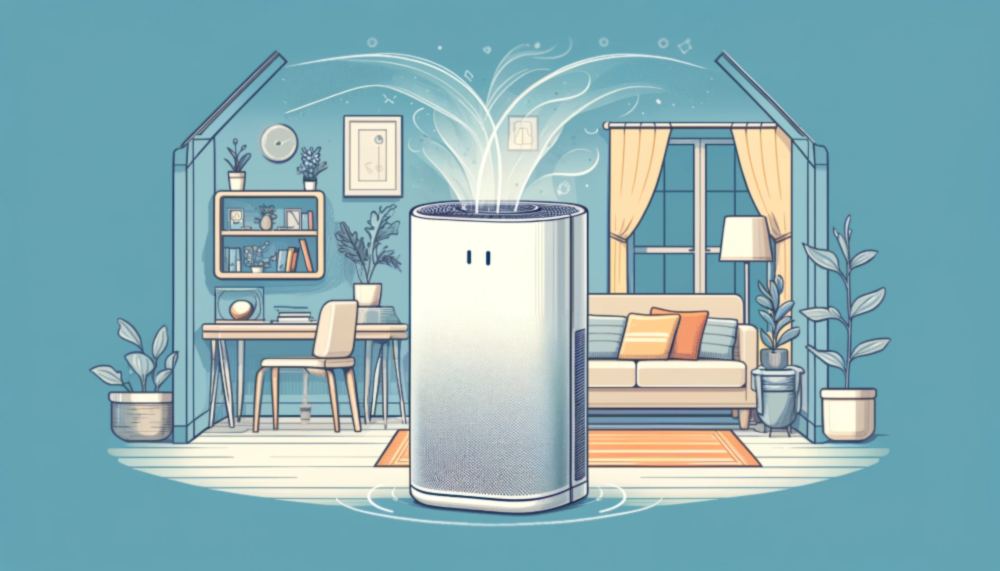
Pets can greatly contribute to the amount of dust in a home, not just through their dander but also by tracking in dirt from outside. Air purifiers combat this issue by pulling air through layers of filters, to capture dust particles along with other airborne pollutants. This results in not only an improvement in overall air quality but also a reduction in the amount of dust settling on furniture and floors. This reduces cleaning, makes the air safe to breathe, and supports a generally healthier living space.
5. Support for Respiratory Conditions
For pets with respiratory issues such as asthma or brachycephalic syndrome, clean air is not just a comfort—it’s a health necessity. Air purifiers can significantly reduce the amount of airborne irritants that can exacerbate these conditions. Reducing these irritants helps prevent respiratory flare-ups and contributes to a better quality of life and comfort for your pet.
6. Helps With Cleaning
With less pet hair, dander, and dust floating around, you’ll find that your home stays cleaner at least a bit longer. This makes for easier cleaning session, freeing up more time to enjoy with your pets and family. A cleaner environment reduces the wear and tear on an HVAC system by minimizing the amount of debris that passes through it.
What is the Best Pet Safe Air Purifier?
For pet owners, choosing the right air purifier is important, not only to ensure the safety of pets but also to effectively manage pet-related odors and allergens like urine smells, dander, hair, dust, and other particulates. Here’s what types and features of air purifiers are most effective for handling common pet-related air quality issues, but that are also safe.
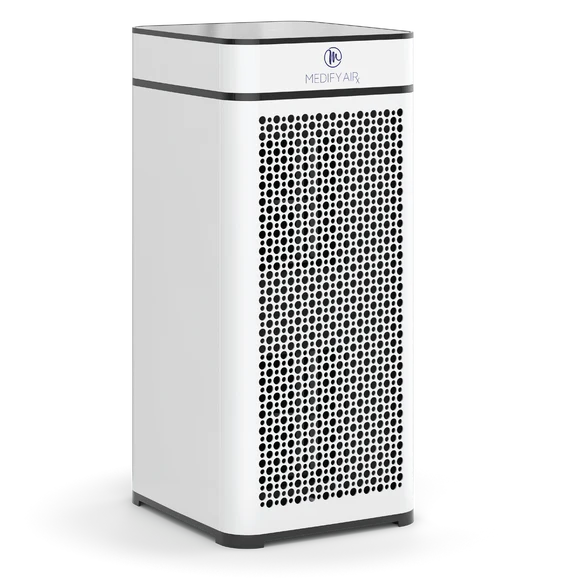
- True HEPA 13 Filter
- Activated Carbon Filter
- Cleans 1793 sq. feet per hour
- Lifetime Warranty
- CARB Certified
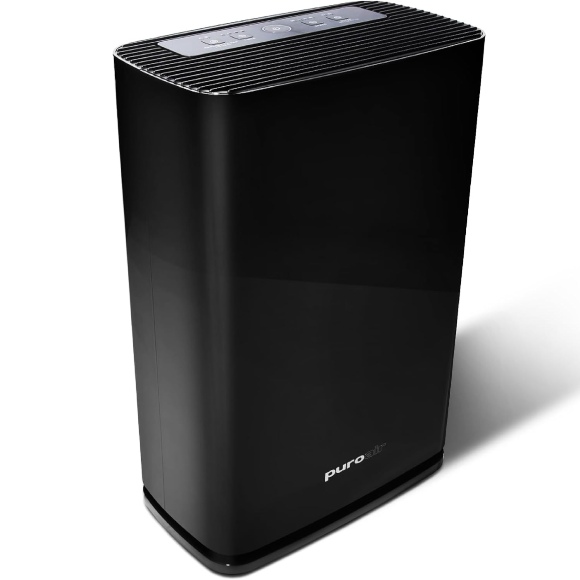
- True HEPA 14 Filter
- Activated Carbon Filter
- Cleans 2145 sq. feet per hour
- Two Year Warranty
- CARB Certified
Key Features for Effective Air Cleaning With Pets
HEPA Filters: High-Efficiency Particulate Air (HEPA) filters are highly recommended for pet owners. These filters capture at least 99.97% of particles as small as 0.3 microns, making them extremely effective at removing pet dander, hair, and dust from the air. HEPA filters do not emit harmful byproducts and are safe for use around pets and humans alike.
Activated Carbon Filters: While HEPA filters excel at capturing particulate matter, activated carbon filters are best at absorbing odors and volatile organic compounds (VOCs). These filters use a bed of activated carbon to remove gases and smells from the air, including those from pet urine and body odors. Combining a HEPA filter with an activated carbon filter can provide comprehensive air purification.
Size and Placement: The effectiveness of an air purifier also depends on its appropriate size and placement. Choose a purifier rated for the square footage of the room where your pets spend most of their time. Placement is also crucial; keep the purifier in a location where air can circulate freely around it, ideally in a central area or near where odors are most concentrated.
Regular Maintenance: To ensure optimal performance, maintain your air purifier according to the manufacturer’s guidelines. This typically involves regular cleaning of pre-filters and timely replacement of HEPA and carbon filters. Neglected filters can harbor bacteria and reduce the overall efficiency of the air purifier.
Research if They Produce Ozone: As discussed, ozone can be harmful to both humans and pets, especially those with respiratory issues. Avoid air purifiers that intentionally generate ozone. Look for products labeled as “ozone-free.”
Additional Buying Considerations
Noise Level: Since the air purifier will likely run continuously in a living space, consider the noise level to ensure it doesn’t disturb you or your pets. Some air purifiers offer a “sleep mode” that reduces noise during operation.
Smart Features: Some modern air purifiers come equipped with smart features such as air quality sensors and automatic adjustments. These sensors detect the level of pollutants in the air and adjust the purifier’s settings accordingly to maintain optimal air quality without manual intervention. This feature is particularly useful for pets, as it can adapt to changes like increased dander or odor after your pet comes in from outside.
For more helpful buying options, see our guide for the 6 Best Air Purfiers of 2024, which are all pet friendly!
Final Thoughts
Choosing the right air purifier is important for keeping your home fresh and clean, especially if you have pets. The best air purifiers for pet owners are those that handle pet hair, dander, and odors without producing harmful ozone. With HEPA and activated carbon filters, you can effectively clean the air and minimize pet-related smells. However, it is important to maintain your air purifier by regularly cleaning it and by replacing the filters when needed.
Air purifiers make a big difference in improving the air quality of your home, which is better for both you and your pets. When buying an air purifier, make sure to steer clear of models that emit ozone, as this can be dangerous, particularly for pets with breathing issues. Overall, getting an air purifier helps to create a safer and more welcoming environment for everyone in your family; including the furry ones.
